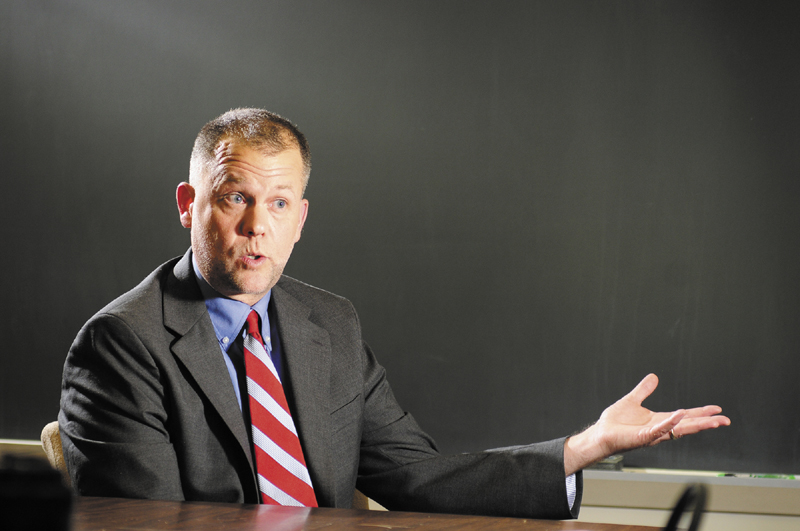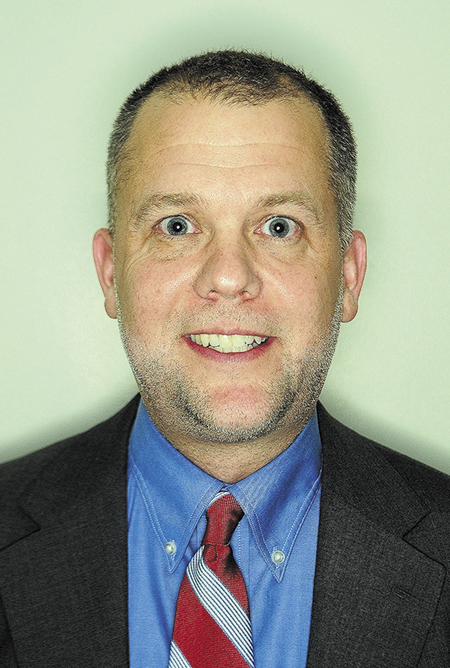SOMERVILLE — After dozens of trips across the Kennebec River this spring, Howard Tuttle officially made his move last week from Gardiner to the superintendent’s office in Regional School Unit 12.
Tuttle, previously curriculum director for RSU 11, officially started his new job July 1, but he’s already worked closely with RSU 12 administrators and school board members on budget development in the absence of interim Superintendent Alan Hawkins, who was ill for much of the year. Hawkins had been hired to fill in as superintendent after Greg Potter took the superintendent’s post in Newport-based RSU 19.
Tuttle has plenty of challenges ahead, starting with getting a budget passed after the first attempt failed in a June 28 referendum. Four of the district’s eight towns — Wiscasset, Westport Island, Palermo and Windsor — are trying to withdraw because of complaints about costs, educational quality and local control. The sprawling, diverse district also includes Alna, Chelsea, Somerville and Whitefield.
Tuttle, 43, lives in Bowdoinham with his wife and their two children, who attend Bowdoinham Community School.
He’s a Connecticut native who started his teaching career in Massachusetts and worked as a teacher, mathematics coach and principal at the elementary-school level in Topsham and Gardiner before becoming RSU 11’s curriculum director five years ago.
While settling in at his Somerville office recently, Tuttle answered questions about improving student achievement, dissatisfaction in the district and reforms RSU 12 will undertake due to state laws passed last year and a federal grant to develop a staff evaluation and compensation system that incorporates student achievement data.
Do you have any sort of philosophy that guides you?
Yes. My philosophy is that education should be student-centered. And what I mean by that is that students have choice in not what they’re learning but how they learn it. There’s some choice there. How they show that they know it. They are engaged in a way that appeals to them, so that the teacher is constantly assessing and reassessing — how do I engage this student, what are they interested in? So that the learning experience is exciting for the student.
I also think that on a district level, districts should pay a lot of attention to how students are achieving, paying attention to student data, making sure that no one’s getting lost along the way. I think that’s a really important piece.
What do you think are the most important changes happening in education in Maine?
To me, the most important initiative, and it’s happening across the nation, is the teacher evaluation and administrator evaluation, myself included. It’s absolutely the most important piece. And I am not convinced that as a profession, we’re doing the best job we could be doing as far as evaluation. So there’s L.D. 1858 that has really said, ‘You need to do a better job,’ and I totally agree with it.
One of the reasons why I was drawn to RSU 12 is they’re participating in the Teacher Incentive Fund (grant). And despite some of the pushback around that fund, I really do think that the intent makes a lot of sense. … It’s not a gotcha. It’s not about trying to fire people. It’s about improvement and self-reflection.
What do you think are the important pieces of an effective evaluation system?
The important pieces are that everyone is real clear on what good instruction is and what the standards are for good teaching. That’s one component.
The next is that administrators need to have the opportunity to calibrate, make sure they understand the standards, make sure they understand what good instruction is.
Then there needs to be accountability, there needs to be follow through, and that’s really the responsibility of the superintendent, of the central office, to make sure that the system is working and taking place.
What’s your take on the state of education in RSU 12 and what should be changed or preserved?
RSU 12 is interesting because as an RSU, it’s fairly young. As far as the schools in the district, they’ve been around a while. They’ve seen different configurations.
My sense is, after talking to folks for the last few months, there’s a sense that people want to preserve as much control as possible over their local school. That’s very important to them. And I think there is a way, I do think there’s a way to have this RSU — this geographically large RSU that provides the professional development for people, the accountability, the oversight — but also preserve the unique aspects of the schools, the local control, those kinds of things.
Having worked in two SADs, even in those SADs there is local control in the buildings as to how they do business, how the teachers and the principal do business, within parameters. You do see the withdrawals happening for various reasons, but one reason is there’s this sense that perhaps the good stuff that we had is being watered down, and they want to preserve that.
There was talk during the budget development about equity, but different towns do want different things. How do you create harmony and equity and still have local control?
RSU 12 was born at a challenging time because it was the same time that the economy began failing. And so folks are seeing these reductions happening; they’re seeing their taxes go up. It’s happening everywhere. It’s happening in my town, in Bowdoinham, and it’s happening here too.
The problem is that there’s a funding formula that people don’t completely agree on. They voted on one last fall, and it seemed like people were OK with it; but of course the northern towns are seeing a big increase over the southern towns.
So it’s creating, from what I can tell in my limited experience here, folks are feeling like, ‘There’s got to be a better situation for us.’ I only hope that the people can start to see that RSU 12 can work. It just needs a little more time.
What can you say to people who are dissatisfied, other than give it more time?
I would have to talk to them, find out what are the problems, what are the issues. Obviously, for some folks it’s taxes: ‘My taxes are going up. They’re going up and it’s RSU 12’s fault.’ We would need to work on budgets that are fair to the taxpayer.
If folks are saying that ‘I don’t have local control; I want more control over the decision-making,’ I think we can make that happen, and we need to find ways of doing that.
One of the ways is a lot more transparency and a lot more communication. … And so when I say give it more time, I don’t mean just sit back and give it more time. I mean sit back, give us feedback so we can move forward and improve.
Could issues with local control be inherent to the structure of an RSU, especially one with eight towns, where each one is only a small part of the district?
I think it’s a balance. It really depends on how much local control we’re talking about, because obviously it’s an RSU. There are certain things the central office needs to do. You know, payroll; there’s one school board, and they all vote. So that is one piece, but I think it’s the day-to-day pieces that we can take a look at that are bothering people.
Somebody told me, ‘Since RSU 12 came along, it’s really difficult for me to use the gym in the school. I have to fill out a form, I have to do all this stuff; whereas before, I could just use the gym. It’s my gym; it’s our town’s gym.’ So I think there are things we can look at to make sure that people feel that they still have local control over their building.
But I also know people want oversight, and there is savings in having a centralized central office. We try to show the savings in the budget book. But again, it’s one of those things where the savings take time.
What sorts of initiatives have you seen work well in your previous districts that you might want to bring to RSU 12?
Actually, one of the reasons why I was so interested in RSU 12 is a lot of the programs they’re doing here we were doing in MSAD 11, and we’ve seen a great jump in student achievement in MSAD 11.
I’ve mentioned the TIF grant, but they’re also using (periodic adaptive tests) to provide a personalized, student-centered learning experience, and really targeting what are the skills that students need to learn, individual students. So as far as differentiating in the classroom, they’re already doing it here. So I’m really excited by that.
So what would I bring? I think we need to do it better. So finding ways, working with the principals and really fine-tuning the system so that we can continue to see improvements in student achievement.
The other piece I’ve heard people talk about is curriculum … should the curriculum be the same throughout the RSU? … I think that will be a big push next year as far as let’s figure out exactly what the K-12 curriculum is, and how does it work kids toward graduation.
L.D. 1422, the proficiency-based diploma, that’s going to drive a lot of this work. That work we were doing in MSAD 11, we continue to do it here. The differences aren’t that great. To me, the biggest difference is how new RSU 12 is as a district and pulling people together and trying to find that balance between the local control and the oversight.
… Town to town, there are not vast differences in curriculum, but there are subtle differences. Those differences we need to take a look at. To me, that’s how schools improve. If you allow some flexibility and one school’s doing something that’s working, and the data shows it’s working, then the other schools may say, ‘Let’s do that, too.’ That’s how I functioned in MSAD 11 as well. There’s five elementary schools, and they’re all doing something slightly different within parameters and learning from each other.
Susan McMillan — 621-5645
smcmillan@mainetoday.com
Send questions/comments to the editors.




Success. Please wait for the page to reload. If the page does not reload within 5 seconds, please refresh the page.
Enter your email and password to access comments.
Hi, to comment on stories you must . This profile is in addition to your subscription and website login.
Already have a commenting profile? .
Invalid username/password.
Please check your email to confirm and complete your registration.
Only subscribers are eligible to post comments. Please subscribe or login first for digital access. Here’s why.
Use the form below to reset your password. When you've submitted your account email, we will send an email with a reset code.